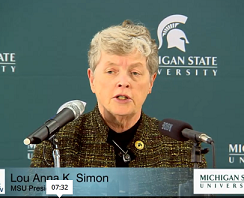Simon Says WKAR Won't Join TV Auction

WKAR-TV, the noncommercial station licensed to Michigan State University, will not be putting spectrum in the incentive auction after all.
It will be sharing with another Michigan TV station, noncommercial WTVS, but expertise, not spectrum.
On Dec. 18, the board of trustees gave university president Lou Anna Simon the authority to put the station's spectrum into the auction, the deadline for which is Tuesday (Jan. 12).
Simon announced the news that that would not be the case at the same time the university announced it was partnering with Detroit Public TV (DPTV) to launch a new kids channel, part of an effort to expand its impact on the Detroit community in the area of pre-school education.
WKAR's opening bid price in the auction was a little north of $200 million, though there was no guarantee that it would be the winning bidder or that the price would not drop, as most opening bid prices likely will.
"We will not be part of the spectrum auction," she said in a joint press conference with DPTV announcing the partnership and the decision to stay out of the auction.
Simon said it was prudent to consider the auction, as well as other options and opportunities, and that the board was very supportive of the decision to stay on the air and team up with PTV.
Broadcasting & Cable Newsletter
The smarter way to stay on top of broadcasting and cable industry. Sign up below
Simon said the she was confident in the vision of creating 24/7 programming for children. She said it was important to "bend" the learning curve through the free access of public TV, as contrasted with pay outlets like cable TV, and the way they needed to think about streaming and new media. (HBO, for example, is now getting first bite at the Sesame Street educational apple, although the episodes wind up on noncommercial stations afterwards.)
She said the new partnership requires that the station be on the air, not do channel sharing--MSU could have put the spectrum in the auction and struck a channel-sharing deal. She said they opted out of sharing because it would foreclose using some new technologies. "Universities have to be on the leading edge of technology and innovation."
She said there were innovative ways to use the spectrum much more effectively, perhaps related to wireless vehicles, where there is an opportunity to use the spectrum for research and innovation. She said there were faculty members "lined up" to do such research.
She also said keeping the spectrum would allow the university to do "all the things" it was imagining for the future and could be provided to all of its partners.
She said the university had been going back and forth about the decision "until the call was made."
But she said the opportunity for the students to be involved in the development of a 24/7 kids channel was one of the important deciding factors.
Contributing editor John Eggerton has been an editor and/or writer on media regulation, legislation and policy for over four decades, including covering the FCC, FTC, Congress, the major media trade associations, and the federal courts. In addition to Multichannel News and Broadcasting + Cable, his work has appeared in Radio World, TV Technology, TV Fax, This Week in Consumer Electronics, Variety and the Encyclopedia Britannica.

